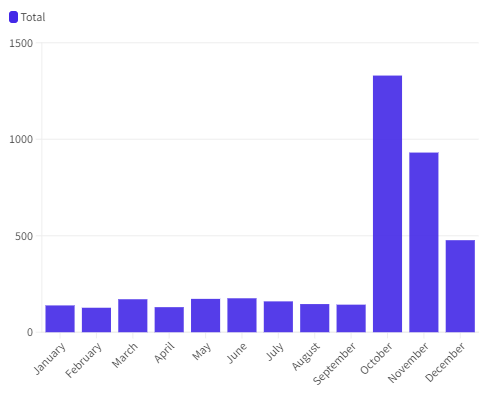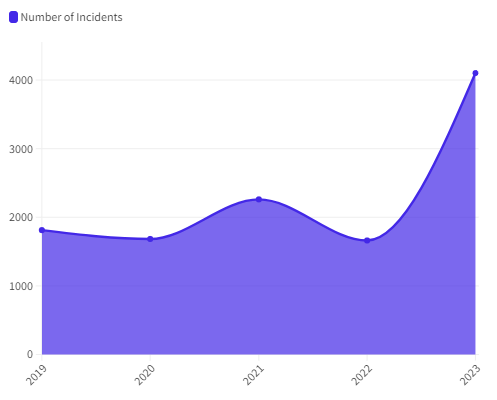
For Noah Kreike, leaving his house wearing a symbol of his faith, is something he now has to prepare for.
Mentally, he readies himself to receive a bombardment of questions regarding the actions of a government for which he isn’t even a citizen. A government which is currently at war.
In 2023, the Community Security Trust recorded 4,103 antisemitic incidents in the UK, the highest total of ever reported in a single calendar year.
In the morning of October 7th, Hamas gunmen launched an unprecedented attack on Israel across Gaza’s border, killing around 1,200 people. Hamas fired thousands of rockets, slaughtered civilians, and took 250 hostages into Gaza.
Of those incidents mentioned, 66 per cent occurred on or after the October 7th attacks.
In brute terms, this is an increase of 147 per cent from the previous year.
Coming second to London in its volume of antisemitic reports, Greater Manchester saw an increase of 163 per cent of anti-Jewish hate incidents from those reported in 2022.

Noah lives in Manchester and is a member of the Jewish faith. He reflected on the sudden surge of racist incidents within his community seemingly overnight.
“The biggest change is coming to terms with the fact that open antisemitism has now become accepted,” he said.
He points to social media and political division for facilitating increasing antisemitism, with users engaging online with current events, with or without a full understanding of a given situation.
He added: “It was no surprise that my feed was full of antisemitic stereotypes being repeated by friends and celebrities.
“These then would end up on placards/posters at [pro-Palestine] protests.”
Noah maintains his distinction between antisemitism and distaste for the Israeli government’s actions during the conflict.
“You can and should support the Palestinian people as they suffer with tremendous hardship,” he added.
However, he said that this shouldn’t intimidate or compromise the safety of Jewish people, as they ‘rally against an unprecedented increase in hate crimes’.
During and after the attacks, Noah explained his difficulty in understanding the doubt or mystification surrounding various accounts of Israeli suffering: given the graphic documentation from Hamas social accounts, where videos of the horrors were livestreamed or posted online.
This includes the growing numbers of Israeli women who were raped on October 7th, as reportedly observed by The Association of Rape Crisis Centers in Israel.
“We were essentially told to believe all women when they have the bravery to say they have been raped, except if they’re Jewish, then they don’t count,” he said.
Acknowledging the long and complicated history of antisemitism not just in the UK, but across the world, he describes how antisemitism will always exist in some form or another.
He concluded: “You can be vehemently against the actions of the Israeli government and do so without calling for the death of Jews.”

Another young member of the Jewish community, Kinneret Lauer, Vice President of the Manchester University Jewish Society, described the uncomfortable reality of having one’s Jewish identity thrown into a negative light.
They said: “When [Judaism] is something which is so intrinsically attached to your identity, and it feels like there is a lot of attack and hatred towards you for an integral part of you, it can be very isolating.
“I have my own life experiences and my values are shaped by that.”
Kinneret echoed the similar sentiment that antisemitism isn’t a new experience for many Jewish people in Manchester and across the UK, the difference now being the amount and potency.
“Most of us have experienced some kind of antisemitism in the past but when it suddenly all kind of happens at once it’s very intense and feels quite uncertain,” they added.
“I don’t think it’s necessarily more severe, but people feel more confidence in doing it: they feel there’s some sort of justification, so it feels a lot louder.”
For Kinneret, student groups such as the Manchester University Jewish Society are vital during this time of increasingly volatile political climates.
They added: “We all come from such different Jewish backgrounds…but it is still so lovely to know I have this community that I can rely on…in a time when I and other [Jewish] students feel alone.”
Marc Levy, Chief executive of the Jewish Representative Council of Greater Manchester and Region, remarked on the record numbers in the CST report.

He said: “What we’ve seen over the past four months… is a surge in hate crime that is completely unprecedented, it is unparalleled.
“The Jewish community is only 270,000 in the UK, over the last year we had over 4,000 incidents directly targeting Jewish people.”
Mr Levy says that the pro-Palestine marches seen across Greater Manchester, have created environments where some protestors feel emboldened to reveal their otherwise hidden antisemitism.
“There are participants on these marches who clearly hold dubious views towards Jewish people.
“You can tell that by the chanting they have been engaging in, the antisemitic flags, flags of terrorist organisations, antisemitic placards…things along those lines.”
Levy also described the phenomenon of substituting the word Jewish for ‘Zionist’.
A rough understanding of Zionism regards the movement to create a Jewish state in the Middle East and thus Zionist support for the existence of the modern state of Israel.
However, there are a minority of people, Levy argues, who are codifying this term to conceal their prejudice.
He said: “When people now talk about the ‘Zionist control’ of the banks, money and politicians, we know exactly what they mean.
“It’s basically engaging in age-old, lazy antisemitic stereotypes, tropes and conspiracy theories…but really focusing it now on Israel and the Jewish state, opposed to Jewish people.
“That’s the kind of caveat that people try to use…to try and stop others from accusing them of being antisemitic.”
For Levy, the solution to the increase in antisemitism lies in increased dialogue between communities, and a zero-tolerance approach to hate.
He argues that there needs to be a space in different boroughs around Greater Manchester to allow the conflict in the Middle East to be discussed in a respectful manner, which hears all voices.
